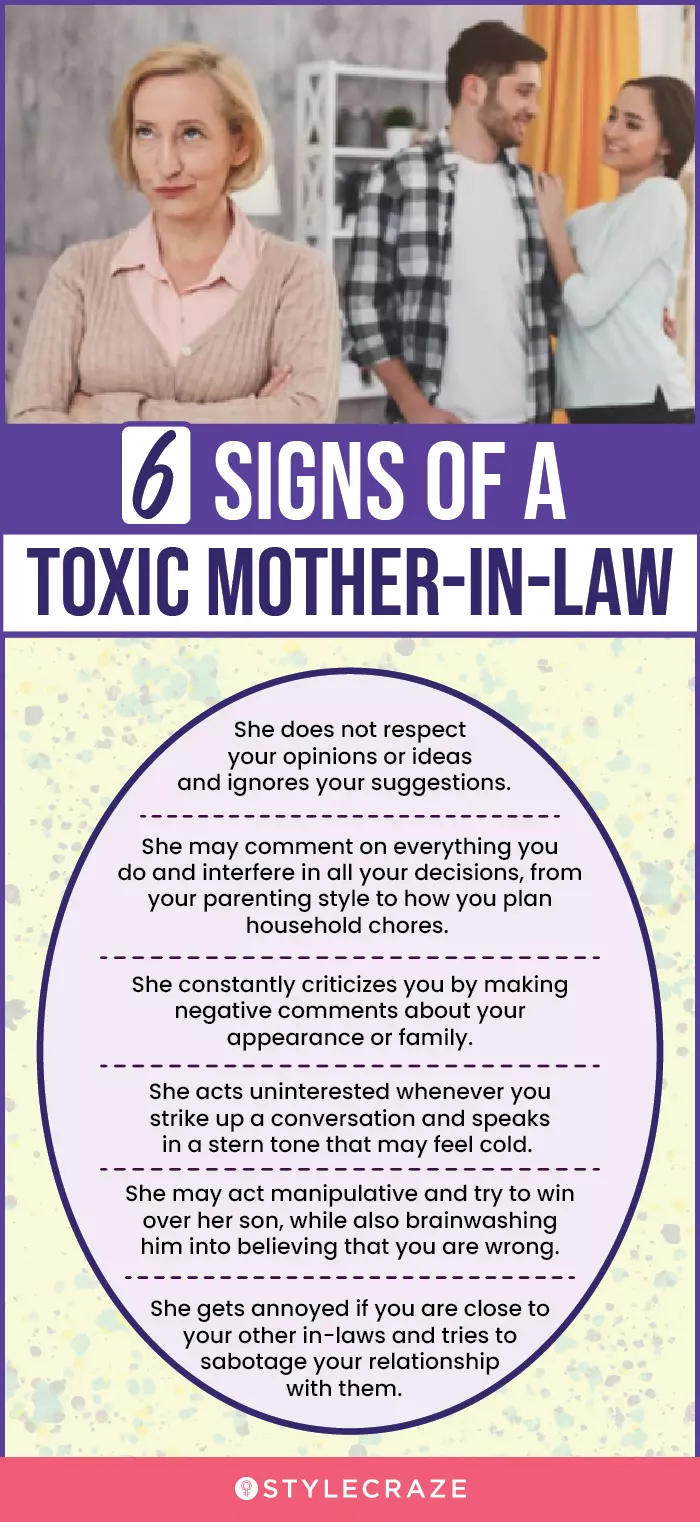13 Signs Of A Toxic Mother-In-Law And How To Deal With Them
From being overly critical to interfering in your decisions, here's what a toxic MIL looks like.

Image: Shutterstock
Dealing with a toxic mother-in-law is undoubtedly a daunting task. However, it is crucial to maintain a good relationship with your in-laws. While some support, care, and respect your boundaries, others are critical and hard to please. Unfortunately, their overbearing attitude can be overwhelming for some of us. Dealing with a toxic mother-in-law in a dysfunctional family dynamic may cause psychological abuse and result in a strained relationship between the couple. Toxic relatives can be detrimental to the well-being of the family, causing issues for even small things and ruining the peace and happiness of your home. It can result in a toxic family dynamic. Toxic people, or in-laws to be more specific, can be manipulative, controlling, and often harbor resentment towards their son or daughter-in-law.
Wondering how to establish a comfortable relationship with your mother-in-law? Worry not because we are here to help. Swipe up to read everything about how to deal with a toxic mother-in-law in a healthy way.
In This Article
13 Signs Of A Toxic Mother-In-Law And How To Deal With Them
1. She Ignores Your Opinions, Thoughts, And Emotions
If your mother-in-law constantly dismisses your opinions or never takes what you say seriously, she may be controlling your life.
Examples of this can look like:
- She’s constantly making negative comments about your appearance, including your clothing choices.
- She disregards what you say or treats it as if it was a joke.
- She criticizes your parenting skills in front of others.
How To Deal With It
: First, when she does this, express yourself calmly and ask her to stop. Second, realize that you may face some resistance when you communicate with her. You are likely speaking through a cultural barrier because some women are conditioned to not object to anything their mothers-in-law say. The best way to deal with this is by practicing active listening and showing appreciation for the intention behind the things she does say.
2. She Interferes With Decisions You Make On Your Own

A toxic mother-in-law may make it her mission to interfere with and intrude on your parenting and household choices. She might:
- Constantly suggest that you do things around the house a certain way.
- Try to always teach you how to deal with family members or friends.
- Make you feel guilty if you don’t do things her way.
How To Deal With It:
You need to stand your ground. Understand that you are an independent person and should be allowed to make your own decisions without being judged or criticized. If she constantly tells you what to do, set clear boundaries by telling her she can’t be involved in your household decisions. For example, you can tell her that the decision about what school your kids attend is entirely yours.
3. She Is Overly Critical Of You And Your Partner

Everyone loves to share their opinion, but a toxic mother-in-law may do it too often. If she never misses an opportunity to criticize you or your partner, it can be extremely hurtful. Examples of this behavior may include:
- She makes every conversation about your or her son’s flaws.
- She frequently tells you that you are “too needy” or not good enough for her son.
- She makes hurtful comments about your household, profession, and appearance.
How To Deal With It:Toxic people
criticize to feel better about themselves or manipulate you into feeling bad. Don’t fall for it! If you feel like she’s trying to make you feel bad, don’t give her the pleasure. Second, set clear boundaries with your mother-in-law by telling her what is and is not acceptable. If she doesn’t stop it after the first warning, take some time apart or limit contact with her.
4. She Is Unapproachable And Cold

If your mother-in-law is distant, uninterested in connecting with you, or always has a terse tone when speaking to you, she may be toxic. She might not be trying to make you feel alone or unwelcome, but she may find it difficult to get along with anyone. This is what it can look like:
- She rarely responds to your requests for help, advice, or just a chat.
- She sounds terse when you talk on the phone.
- She rarely asks about your day or initiates a conversation with you.
- She makes off-putting comments like “I don’t like you” or “I don’t know why my son likes you.”
How To Deal With It:
Remember, it’s not about you! She may have been raised in a different culture where a mother-in-law being cold and distant is the norm. If that seems to be the case, just try to connect on as many other levels as possible. You can also show her that you appreciate her by being warm and friendly. For example, compliment her on the things she does for you.
 Quick Tip
Quick TipShe may also hold grudges. She might still be holding resentment against you for anything you did in the past that she may have not let go of to this day. It’s crucial to have a chat with her to explain that the past should be left behind and that you should be able to move on.
5. She Jokes About Your Difficulties Because Of Race Or Culture
Not everyone is going to have an easy time understanding or relating to your background or culture, but she may often make jokes at your expense to try and get a reaction out of you. She might:
- Make comments about how you don’t know how to behave around people because of your culture. For example: “I’m surprised my son didn’t teach you better table manners!”
- Criticize something about your race or culture that’s different from her own, such as finding your accent annoying or your food weird.
- Use jokes to point out your flaws. For example: “You know, you should always cover your mouth when you laugh because of those Asian teeth.”
How To Deal With It:
Resist the urge to explain or defend yourself after she makes one of these comments. Destructive people try to get a reaction out of you, so giving them one will only encourage this kind of behavior. Instead, respond by keeping your tone light and showing that you are unaffected.
 Quick Tip
Quick TipShe belittles your family. She might, for instance, ignore or neglect to invite members on your side of the family to events. She talks about them as if she is above them.
6. She Is Overly Jealous Of Your Relationship With Your Spouse

If your mother-in-law is constantly finding faults with you, trying to sabotage your time with your partner, or being overly competitive in some way, she might be jealous of the relationship you have with her son. This could look like this:
- She frequently tries to point out your flaws to her son. For example, “She’s a bad cook” or “She doesn’t tell you she loves you enough.”
- She frequently tries to undermine your bond. For instance, when your husband says something positive about you, she may respond with, “She is not that“
- She frequently compares herself to you and makes herself seem superior, such as, “I’ve been with my son longer than you have” or “My son prefers having dinner with me.”
How To Deal With It:
Understand that it’s likely that she will never like you simply because she will always see you as a threat. This can be hard to deal with, but remember that her behavior is an indication of how important the relationship with her son is to her. If possible, try to stay relaxed and friendly with her in front of others so it does not look like there’s any drama. You can talk about her hurtful comments in private, but make sure you stay calm and do not get aggressive or defensive.
8. She Is Passive-Aggressive About Small Things
Toxic people often act passive-aggressively to try and get what they want, whether it’s making you feel small or getting something out of your relationship with her son. For example, she might:
- Make small requests that seem easy to fulfill but are ways of making you feel bad about yourself. For example: “I know it’s a lot to ask, but can you clean your bathroom?”
- If you decline an invitation, she might send repeated messages asking when you are free.
- She often makes critical comments such as, “I always prided myself on how clean I kept my house” or “It’s a shame you don’t have a cleaner.”
How To Deal With It:
If possible, try not to react when she is passive-aggressive. Instead, stay calm and tell her you will remember this for next time. You could also simply ignore her because the more attention you give her, the more she will do it. Try to focus on spending time with your husband and supporting each other when she is difficult.
9. She Manipulates Your Husband

There’s nothing wrong with wanting to feel close to her son, but if she tries to make him choose her over you, it might be time to set some boundaries. Remember, he is not her property, and you deserve to be his priority too.
She may manipulate him by:
- Trying to get him on her side by saying things like, “Do you see how your wife behaves?”
- Making him think that you are trying to keep him away from his family.
- Getting upset if you both go out without her and trying to guilt him into staying home with her instead.
Situations like this can quickly escalate into big issues.
How To Deal With It: Don’t allow her to be manipulative or demanding toward your husband or make him feel guilty. If she does this, try not to react in front of her because any negativity will encourage her. Instead, bring it up when you are alone with your husband and tell him that you won’t tolerate being treated that way.
It is also important to remember that actions speak louder than words, especially in a toxic relationship. If you stand up for yourself, she will realize that she can’t manipulate you.
10. She Makes You Feel Guarded All The Time
If you feel like she is constantly watching what you are doing, asking you where you are going and what you are doing, it is probably because she suspects or hopes to find dirt on you. If this kind of behavior makes you feel frustrated or angry, you might be dealing with a mother-in-law who is narcissistic and practices emotional abuse. This kind of behavior is a major sign that you are in a toxic relationship with your mother-in-law.
How To Deal With It: You should never have to feel guarded or cautious when you are spending time with your husband. If she makes you feel like this, it is important to tell yourself that you deserve to be able to do what you want when you want. Don’t allow her to make you feel like you are doing something wrong when you are simply living your life.
11. She Hates That You Are Close With Your Other In-Laws
If she does not like that you have a good relationship with her husband and children, you might be dealing with toxic behavior from your mother-in-law. Some things that she does may include the following:
- She may try to poison their minds against you by telling them lies about you and inferring that you secretly hate them.
- She may constantly bring up how important family loyalty is.
- She may accuse you of trying to sabotage their relationship with her.
How To Deal With It:
If she implies that you are trying to turn her family against her, you mustn’t engage with her or try giving any justification for your actions. Instead, implore her to rethink what she is saying and what you would gain from creating such family drama. Tell her that you are on her side and want to build a good relationship with her. You shouldn’t be made to feel guilty for having a good relationship with your in-laws. Remember that you don’t have to choose sides; everyone deserves to be loved. If she brings up family loyalty, tell her that everyone in the family loves each other, and it’s not a competition.
12. She Gossips About You With Family And Friends
Gossiping about you behind your back is immature and indicative of a toxic personality. If she is telling other people things like your marriage is not going well or that you are bad at cooking, it might be time to tell her how much negativity she’s bringing into everyone’s lives.
How To Deal With It: Know that it’s not your fault. There is no way that you can change people’s thoughts about you. You should never have to deal with someone talking badly about you, so don’t let it get to you. Challenge her on what she says and tell her calmly how it makes you feel. Stand up for yourself and tell her that gossiping about you is ruining her relationship with not only you but also her son.
13. She Makes You Doubt Yourself
Your mother-in-law’s toxic behaviors can manifest in various forms, including manipulation, criticism, and attempts to undermine your self-confidence. Here are some things that she may to do to make you doubt yourself:
- She questions your decisions, particularly in front of others, making you wonder about your judgment.
- She manipulates situations and people to make you appear at fault or raise questions about your character, causing you to question your integrity.
- She criticizes your appearance or parenting choices, making you question your self-worth in many situations.
Once you can identify the signs of a toxic mother-in-law, you may become attuned to how you’ve been emotionally impacted by this relationship. Chronic negativity, manipulation, or criticism can have negative impacts on your mental and emotional health. And this is something we need to get into. Read on.
Key Takeaways
- If your mother-in-law dismisses your thoughts, emotions and opinions, she has toxic traits.
- To maintain a healthy relationship with a toxic mother-in-law, it is important to be a good listener and merge communication gaps between the two.
- Be patient and understand her traits. But make sure to stand up for yourself whenever it is required.
The Emotional Toll Of A Toxic Relationship With Mother-In-Law
Dealing with a toxic mother-in-law can create significant emotional stress and strain within your family affecting everyone’s mental health. Whether it’s passive-aggressive remarks, constant criticism, or manipulative behavior, these interactions aren’t acceptable. Learning to manage the resultant emotional fallout is crucial for preserving your well-being and maintaining balance in your relationship with your partner.
The constant emotional strain from a toxic mother-in-law can manifest in various ways, from feelings of inadequacy to heightened anxiety. You may find yourself constantly walking on eggshells, trying to avoid conflict or criticism. Over time, this can lead to a sense of isolation, as you may feel unsupported or misunderstood by your partner or other family members.
It’s important to seek emotional support when dealing with a toxic mother-in-law. Whether it’s through therapy, talking with a trusted friend, or finding online support groups, having an outlet to express your frustrations and receive guidance can be incredibly helpful.
Read on below to know more ways of dealing with this situation.
How To Deal With It
Dealing with a toxic mother-in-law requires setting clear boundaries, maintaining self-confidence, and open communication with your spouse. You can also seek support from your family or friends, practice empathy, and develop healthy coping strategies like yoga or meditation. If the situation becomes unbearable, consider professional help to cope with the situation.
If you have a toxic in-law, you may be tempted to get back at her. Find out what to do in such a situation below.
This blogger explains the issues that she faced in putting up with a toxic mother-in-law. She lived in a rural community where everyone knew each other; her husband was the only child. Each holiday visit would include jabs and cutting remarks. When the tension started affecting the children, they confined the visits to brief holidays. The mother-in-law spread the word in the town, and everyone started resenting her for the behavior. She elaborated, “My husband’s family members slowly turned away from us. Friends of his parents treated us coldly as well. Even our daughter’s friends whose mothers were friendly with my mother-in-law quit speaking to our daughter. We heard snippets of the criticism from people in town. We discovered that she complained about us to anyone who would listen (i).”
How Do I Get Back At A Toxic Mother-In-Law?
Trying to get back at your mother-in-law is not a healthy approach. Since she is your husband’s mother, there are certain boundaries that you are not allowed to cross. Trying to manipulate your husband and poisoning his mind against her will only create strain in all your relationships.
If her behavior is bad enough, you should sit down with your husband and tell him that it is not okay. Ask him to have a word with her about the way she talks to you or the things she says behind your back.
If you think this won’t work, try writing her a letter. Explain how her behavior has affected you, and ask her to think about how it makes you feel. Sometimes, writing a letter can have more impact than sitting down and having a face-to-face conversation. It gives you a chance to collect your thoughts and make your case in an organized manner. It may also prevent both of you from getting into a heated argument.
Now, let’s answer the question that is on everyone’s mind.
Why Do Mothers-In-Law Cause Problems?
Many mothers believe that no woman is good enough for her precious son. Your mother-in-law may hate seeing another woman (i.e., you) being prioritized by her son. This makes her feel insecure and lash out against you.
She may also cause problems because she does not see eye-to-eye with your parents. She may not like how close you are to your family or think your parents are interfering in your life. Thus, she never misses a chance to make hurtful remarks about them in front of you. She may go as far as telling you that you need to cut ties with them.
Infographic: 6 Signs Of A Toxic Mother-In-Law
If you find yourself experiencing consistent hostile behavior from your mother-in-law, it is important to address the issue. The challenge lies in determining whether these arguments are a normal part of human interactions or if you are dealing with a toxic individual. To help you discern the situation, we have compiled an infographic listing the six key signs that may indicate if your mother-in-law’s behavior is toxic and requires careful consideration. Check it out!

Illustration: StyleCraze Design Team
Enduring the pain given by toxic people can harm your peace and disrupt your mental health. So, if your mother-in-law is toxic and you can relate to the points we have mentioned above, without any delay, take steps to eliminate the negativity around you. You do not necessarily have to leave her. You can sit down, have a healthy conversation, and make her understand that her behavior is impacting you badly. Your toxic mother-in-law may be going through a hard time too, which is eventually causing her to behave in this unacceptable way. So, allow her to share her points. If everything else fails, seek professional help.
Frequently Asked Questions
Is it normal not to like your mother-in-law?
Yes. People usually dislike their mother-in-law because she may interfere with their relationship, have no boundaries, or be overly critical. Many people also don’t get along with their in-laws due to differences in opinion, usually brought on by a generation gap.
How do I leave my mother-in-law?
Have an honest conversation with your spouse and your mother-in-law, and explain your problems and point of view calmly and clearly. Provide alternatives everyone can work with before giving the ultimatum for her to leave.
How do I disarm or set boundaries with my toxic mother-in-law?
Dealing with a toxic mother-in-law can be challenging, but one way to work through it is to set clear boundaries and be firm and unapologetic about them while being polite and respectful.
How do I remove myself from toxic in-laws?
You can refrain from toxic behavior by limiting your interactions with your in-laws. Make sure to prioritize your physical and mental health as well, and if necessary, ask your partner for support or consult a therapist. You could also try showing them genuine gratitude, being kind, and breaking the toxic cycle.
How do I deal with my cunning and taunting mother-in-law?
Talk to your spouse about your issues and allow him or her to be inclined and take a stand and set clear boundaries together.
Is it possible to have a healthy relationship with a toxic mother-in-law, and if so, how?
Yes, it is possible to maintain a positive bond with a toxic mother-in-law, but it takes effort and cooperation from both sides. Try to find common ground and build a relationship based on shared interests or positive experiences. Try to understand where both of you are coming from and each other’s perspective, then work towards resolving conflicts and building a stronger relationship. Remember to communicate openly and listen actively to each other’s concerns. Remember, it takes patience and compassion to build a strong and healthy relationship with anyone.
Uncover the red flags of a toxic mother-in-law. From controlling behaviors to constant criticism, watch this eye-opening video and gain insight into 8 terrible signs and learn how to navigate this situation.
Personal Experience: Source
StyleCraze's articles are interwoven with authentic personal narratives that provide depth and resonance to our content. Below are the sources of the personal accounts referenced in this article.
i. When Your Mother-in-Law Suffershttps://familiarminds.wordpress.com/2012/04/25/when-your-mother-in-law-suffers/
Read full bio of Vincenzo Sinisi
Read full bio of Sneha Tete
Read full bio of Asmita De
Read full bio of Gracia Odile




























Community Experiences
Join the conversation and become a part of our empowering community! Share your stories, experiences, and insights to connect with other beauty, lifestyle, and health enthusiasts.